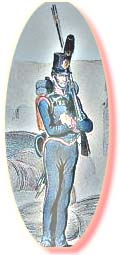|
|
|
|
|
|
 mercenaries were recruited
and sent in America
mercenaries were recruited
and sent in AmericaWork of Wilhelmy (1982, 1984, 1988 and 1997) on the German mercenaries is well documented and recognized among the historians (Vaugeois, 1988 ). It also fed some journalists (Racine, 1989).
It is made there mention that patronym BESRÉ
would come, like several other québécois names,
besides, of the transformation of a German patronym. Of his list
of the mercenaries who settled
in Quebec (Wilhelmy,1997, p.205-230)
one can raise three BESSERER. They are fore-mentioned
Freidrich, Ludwig, supposed soldiers and, Theodore the doctor.
Pierre-George Roy (1917) described the
doctor in
these terms:
"Chirurgien dans un des bataillons allemands venus au Canada en 1776 sous les ordres du baron de Riedesel, une fois la paix conclue, il obtint son congé et s'établit comme médecin au Château-Richer, où il avait été en garnison avec son régiment, puis à la Sainte-Famille de l'île d'Orléans, où il resta jusqu'à sa mort." (p.30)
The famous historian (Roy, 1917) adds
that in the act of burial of the second wire of the doctor, died
in low age, it is
known as:
"...qu"il est le fils du sr Jean-Théodore Besrer, docteur dans le régiment du prince Brunswick."(p31)
Here from which comes the idea conveyed by Wilhelmy (1984).
"Recrutés un peu partout à travers l'Allemagne, l'Europe et même au-delà lorsque les nouvelles recrues se font de plus en plus rares, ils nous laissent des noms aussi différents que leurs provenances. Difficiles à prononcer, certains se métamorphosent et les Koch deviennent Caux, les Besserer - Besré, les Maher - Maheu, les Loeder-Laître/Lettre, les Beyer - Payeur, les Pfeiffer - Fiffre, les Schumpff - Jomphe."(p.198)
It suggests a transformation of BESSERER to BESRÉ. The analysis of Wilhelmy on the evolution of the patronyms of German to French-Canadian is generally based on the translation, the phonetic similarity or the francization of the name. The conversion of name BESSERER into BESRÉ would hold simply as for him, with its difficulty of pronunciation. Beyond its orthographical evolution of BESSERER with Besrer, then with BESRÉ. This explanation of the metamorphosis of the patronym, although apparently possible, is not based on any filiation. It holds unfortunately more than one supposed modification and phonetic mistake that reality. Undoubtedly BESSERER changed but surely not in BESRÉ, not in Québec at least and elsewhere Besrer are extremely rare.
According to the family record book, our genealogy would go
up to Olivier born in Saint-Jouan-des-Guérets close
to
Saint-Malo, about 1870. Of three wire of Olivier, two emigrated
in America about 1920 while the other (Maurice)
remained in Saint-Jouan. Charles settle in New York and
Adolphe in Sherbrooke. Thus, the descendants of
Olivier meet, today, as well in France as in Québec.
Moreover, the civil acts (not stripped) of the commune of Saint-Jouan
(Ille et Vialine) give a report on BESRÉ until
about 1709. In the contiguous commune (Plouër-sur-Rance in
Côtes d'Armor) the branch Sévéric,
probably different,
goes back to 1822 and draws its origin from the modification of
patronym BERRÉ. It is as in Brittany as one finds
the
greatest number of alive descendants and civil acts of families
BERRÉ, BERRE, BERRÉE, BÉRÉE,
BEREE, BERÉE,
BESRÉE, BESRET and BESREST. We did
not find, at date, any Besrer. According to our search,
there are not other
BESRÉ families known in America nor elsewhere in
Europe. There is no doubt the node is in Armorique.
In addition, the Breton pronunciation of the BESRÉ
patronym leaves the S dumb. The French branch of Olivier of
Saint-Jouan and that of Sévéric of Plouër says
it without S. Only the québécois branch of the Saint-Jouan
family use the whistled pronunciation and this recently. It is
undoubtedly a means adopted by Charles, Adolphe and his descendants
in order to make the orthography more obvious to their Americans,
Canadians and French-Cnadians interlocutors of the time.
Thus, the BESRÉ would not be the descendants of the German soldiers named BESSERER as supports by Wilhelmy (1997) but rather the Breton ones of the area of Saint-Malo - Dinan from which the name would probably come from a similar patronym. Later search will specify it.
| |
 ©2000besre.com ©2000besre.com |